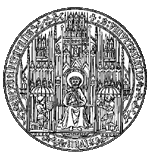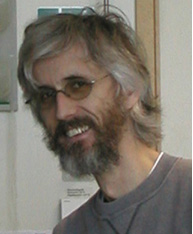
| |
Matthias P. Mayer
PhD 1990 University of Freiburg
Postdoctoral work at the University of Utah, Salt Lake City, USA and the Centre Médical Universitaire Genève, Switzerland
Project group leader since 1997 at the Institute for Biochemistry and Molecular Biology, University of Freiburg and since 2002 at the ZMBH, University of Heidelberg.
Chaperone mediated protein folding
Current research
Inside a living cell many polypeptides need the assistance of a set of specialized proteins, so called molecular chaperones, in order to attain and keep their active conformation. The 70 kDa heat shock proteins (Hsp70) are a family of chaperones that assists many folding processes including folding of newly synthesized and stress denatured polypeptides, translocation of proteins into organelles, assembly and disassembly of oligomeric complexes, and control of stability and activity of regulatory proteins. To no other group of chaperones such a wide variety of folding tasks has been attributed. The evolutionary strategy of adaptation to their specific functions comprise (i) structural variations including large insertions into the substrate binding domain leading to the Hsp110 and Hsp170 relatives, (ii) regulation by a large number of cofactors, and (iii) cooperation with other chaperones e.g. Hsp90s and Hsp100s. While the basic functional cycle of the Hsp70 chaperones was elucidated to a certain degree, little is known about the biochemical function and the physiological role of many of the cofactors and about the integration of several chaperones into a folding machine. In addition, the mechanistic consequences of many of the variations within the Hsp70 structure are poorly understood. Especially the Hsp110 and Hsp170 relatives remained up to now enigmatic. There are indications that Hsp110 cooperate with other chaperones including Hsp70 and Hsp90 proteins to form large molecular machines.
Contact:
Matthias P. Mayer
ZMBH
Im Neuenheimer Feld 282, D-69120 Heidelberg
Germany
Tel.: +49-6221-54 68 29
Fax: +49-6221-54 58 94
email: M.Mayer@zmbh.uni-heidelberg.de
personal home page:
http://www.zmbh.uni-heidelberg.de/Bukau/research2.html
Projects for a doctoral thesis
Biochemical and biophysical characterization of cofactors of the eukaryotic Hsp70 chaperones.
Identification of chaperone-binding sites and analysis of the conformation of chaperone bound substrates using mass-spectrometry and proton-deuterium exchange experiments.
Characterization of the ATPase cycle and the chaperone activity of Hsp110 proteins.
Search for cooperating proteins and targeting factors of the Hsp110 chaperones using genetic and biochemical methods.
Selected publications
Mayer, M.P., Brehmer, D., Gässler, C.S. and Bukau, B. (2001) Hsp70 Chaperone Machines. In Horwich, A.L. (ed.) Advances in Protein Chemistry: Protein folding in the Cell. Academic Press, San Diego, Vol. 59, pp. 1-44.
Mayer, M.P., Schröder, H., Rüdiger, S., Paal, K., Laufen, T. and Bukau, B. (2000) Multistep mechanism of substrate binding determines chaperone activity of Hsp70. Nature Struct. Biol., 7, 586-593.
Gässler, C.S., Wiederkehr, T., Brehmer, D., Bukau, B. and Mayer, M.P. (2001) Bag-1M accelerates nucleotide release of human Hsc70 and Hsp70 and can act concentration dependent as positive and negative cofactor. J. Biol. Chem., 276, 32538-32544.
Kluck, C., Pazelt, H., Genevaux, P., Brehmer, D., Rist, W., Schneider-Mergener, J., Bukau, B. and Mayer, M.P. (2002) Structure-function analysis of HscC, the Escherichia coli member of a novel subfamily of specialized Hsp70 chaperones. J. Biol. Chem., 277,41060-41069.
